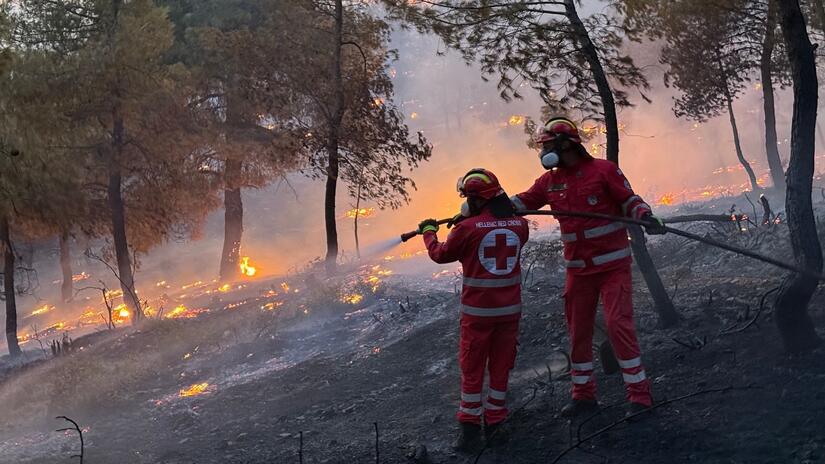
As heatwaves and wildfires sweep across Europe - putting lives and livelihoods at risk - Red Cross and Red Crescent teams are responding to escalating emergencies that are hitting hardest on those most vulnerable to their effects.
Extreme heat claims thousands of lives every year and the most at risk include older people, outdoor workers, people on the move or experiencing homelessness, and communities in fire-prone areas. "Heatwaves and wildfires are no longer isolated events; they are becoming the new reality for millions across Europe," said Birgitte Bischoff Ebbeson, IFRC Regional Director for Europe. "Summer after summer, we see that heatwaves are becoming deadlier, fires more intense, and the people most at risk are often the least prepared."
The International Federation of Red Cross and Red Crescent Societies' (IFRC) network has mobilized to provide safety tips, check on the most vulnerable and support efforts to battle wildfires.
During Europe's recent heatwave, Red Cross teams are sharing health advice and safety tips, including on how to stay cool and manage sun exposure, recognize the signs of heat-related illnesses, store medication properly and provide care to pets.
Helping people stay cool
In Spain's southern coastal city of Malaga, the Red Cross has set up a "climate refuge", air-conditioned down to the low twenties, to help residents "cope with the heat in comfort and with company, avoiding the isolation and loneliness" that extreme heat can impose, as people are forced to stay indoors.
In other parts of the country, Spanish Red Cross volunteers help people with reduced mobility cool down at the beach through their assisted bathing service. This seemingly small act can make a world of difference to help someone cool down.
In Vienna, the Austrian Red Cross is running summer cooling centres, now receiving up to 40 visitors per day. While it is open to all visitors who seek respite from the heat, it particularly addresses older people, children, and people with chronic illnesses.
In Greece, the Red Cross activates an Early Action Protocol before heatwaves hit - and volunteers distribute water, isotonic drinks (that help replace fluids and electrolytes), food, and sunscreen, and perform wellness checks with mobile first aid teams.
In North Macedonia, the Red Cross volunteers are addressing the severe risks faced by people on the move in such hot weather.
"We are seeing an uptick in heat-related medical conditions like dehydration, heat exhaustion, sunburn and heat stroke," says Sandra Tomovska, the national field coordinator at the Red Cross of North Macedonia.
"People lack access to drinking water and shade during their long, exposed journeys on foot. The heat also intensifies their psychological stress."
The mobile teams are distributing hydration supplies and sun protection to people on the move while coordinating with authorities to ensure safe transit amid extreme heat.
Extreme temperatures across the continent contribute to intensified wildfires. From Türkiye and Greece to France and Norway, Red Cross and Red Crescent teams mobilize to support responders battling fires. They are providing first aid and delivering water, food, and other essential items to affected people.
Extreme heat doesn't have to become a disaster
As climate change pushes average temperatures higher, it is also leading to more frequent extreme heat events. They are arriving earlier, lasting longer, and hitting harder. But it doesn't have to become a disaster if communities are warned well in advance and prepared.
The IFRC urges everyone to take simple, lifesaving steps:
• stay hydrated
• avoid peak heat hours
• check on older people and neighbours
• and learn to recognize signs of heatstroke.
Strengthening local capacities, such as training volunteers and equipping communities to better cope with and adapt to extreme heat, can mean the difference between life and death.
Red Cross and Red Crescent volunteers are embedded into their communities, which means that they can get help to the right place faster.
"Preparedness saves lives. It allows us to protect people before, during, and after emergencies. When we have systems, partnerships, and training in place before an extreme weather event, we can respond within hours - not days," adds Birgitte Bischoff Ebbesen.

